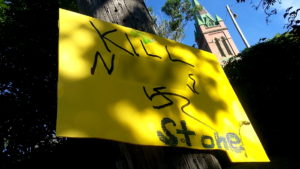Canadian Criminal Code has fallen behind what such offences have become.
On an ordinary morning in August 2015, St. John’s residents woke up to something unusual and unsettling.
A yellow sign was posted to a telephone pole located at the bottom of Long’s Hill and just at the top of Livingston Street. Above a hand-drawn swastika, the sign read “Kill n—-ers.” While police investigated the incident, no arrests were made.

City officials quickly labelled the act as a hate crime, but what exactly constitutes a hate crime in Canada today?
“A hate crime would imply some level of prejudice against a group of people,” said Bob Buffett of the St. John’s sheriff’s dept. “It is a criminal breach if the intent is to act maliciously. If the intent is in attacking a group whether it’s due to religion, colour or sexuality.”
According to sections 318 and 319 of the Canadian Criminal Code, a hate crime is “Committed to intimidate, harm or terrify not only a person, but an entire group of people to which the victim belongs.”
Usually, victims of hate crimes are targeted for who they are, not because of anything they have done. Hate is the motive and it can involve intimidation, harassment, physical force or threat of physical force against a person, a group or a property.
“They almost feel they are entitled to do that.”
“Usually these types of actions are actions taken to belittle the other person,” said Sharon Veley, guidance counsellor at the College of the North Atlantic. “People committing hate crimes are usually parts of groups themselves. When one group gets targeted, another group feels they need to take punitive action. They almost feel they are entitled to do that.”
With the rise of populists such as U.S. president Donald Trump, certain groups such as Muslim-Canadians. On Jan. 29, Alexandre Bissonnette, who said he was a fan of Trump, walked into a Quebec City mosque and gunned down six men as they prayed.
The penalties for hate crimes vary and Buffett says the Criminal Code has fallen behind.
“Unfortunately, the criminal code has not been re-written in some time,” Buffett said. “We are all entitled to our opinion, but it’s a matter of culpability.
“When there’s an intent to harm, whether that’s physical or otherwise, then it becomes a hate crime.
Buffett says while people have the right to voice their opinions, there is a clear line between free speech and hate speech.
“We live in a pluralistic society,” said Buffett. “We all have the right to demonstrate, but not segregate.”



